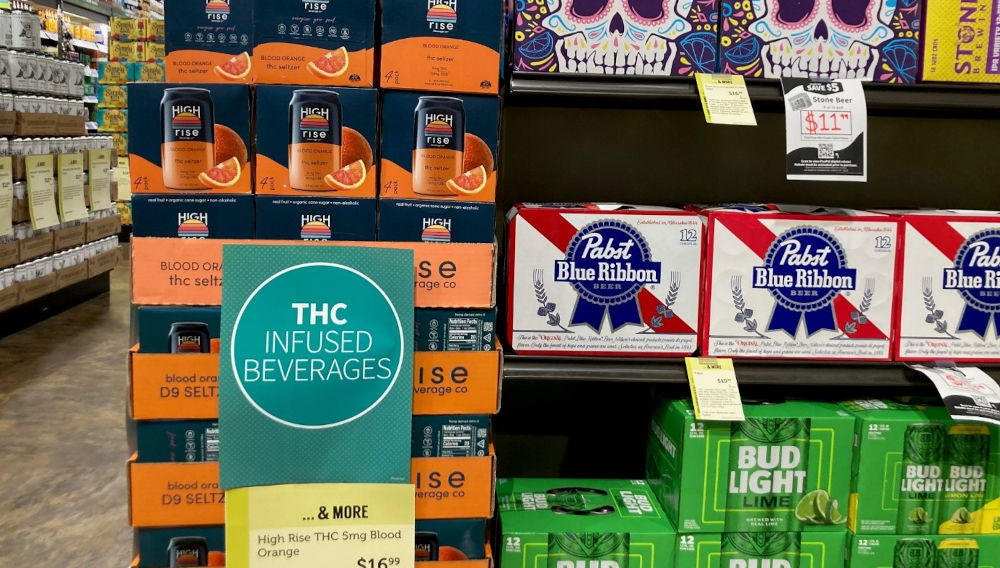Hemp THC beverages are pitting hemp firms against cannabis firms
USA | Some marijuana companies and trade groups are pushing US Congress to close a loophole that allows the production and sale of intoxicating substances derived from legal hemp. The hemp industry, however, wants to leave the federal definition of hemp unchanged. The current Farm Bill is set to expire at the end of the fiscal year 2025. This means Congress will need to reauthorise or revise the existing legislation.
The loophole originated in 2018 when The Agriculture Improvement Act (“Farm Bill”) legalised hemp. Hemp and cannabis are basically the same plant, except that hemp has less of the psychoactive compound THC. By law, hemp may only contain less than 0.3 percent THC on a dry weight basis. Cannabis with more than 0.3 percent THC, meanwhile, is considered marijuana and remains federally illegal, yet legal in several states.
Many lawmakers, who backed hemp legalisation then, hoped that it would invite farmers to grow hemp for fibre and grain purposes. Alas, they did not realise they were approving an intoxicating substance. Post-legalisation, the market for hemp rope, fabric and other non-ingestible products was slow to develop. But, eventually, intoxicating hemp derivatives became popular, especially when hemp companies found a way to get enough hemp THC into a beverage or an edible to have psychoactive effects, without breaking the law.
An expanding niche
In 2020, the US market for hemp-derived THC drinks amounted to about USD 400,000, according to Brightfield Group, a market research firm. By 2024, the market had grown significantly, reaching USD 382 million dollars. This year, it might grow to USD 571 million, Brightfield predicts, with more expansion to come. Though forecasts are a murky business, data firm Euromonitor International projects sales of hemp THC beverages to balloon to USD 4.1 billion by 2028. Nevertheless, these beverages represent a small segment. The US cannabis industry is expected to reach almost USD 45 billion in sales in 2025.
Hemp THC drink brands describe their products as “social tonics”, designed to give a light, mellow buzz that, they say, will help you feel good at parties but not hungover the next day. These drinks come in various flavours and tend to have no more than 10 mg of THC per can.
Mostly still unregulated
Intoxicating products, while a boon to the hemp industry’s economic outlook, challenged state-legal cannabis industries. The lower cost and greater availability of intoxicating hemp THC products made them a potent rival. The beauty of these hemp THC beverages is that – unlike cannabis-derived THC products, which must be sold in dispensaries – they can be sold in convenience stores, petrol stations and liquor stores. Most ominously for brewers, hemp THC beverages are often displayed right next to beer, which indicates that brewers should be deeply worried, too.
Because of these beverages’ novelty character, they are largely unregulated. Individual states are seeking to remedy this. Bills introduced across 27 states and Washington DC this year focus on three key areas: THC content limitations, packaging/labelling requirements that prevent their appeal to children, and age restrictions.
Despite their own sales growth, cannabis firms are miffed that their hemp rivals are having such a good time while they suffer from overregulation, excessive taxes, complicated operating requirements and a lack of a cohesive, federal regulatory structure. Besides, there are still 26 states that do not permit recreational cannabis.
Lawmakers need to decide
Ahead of the Farm Bill 2025, the US Cannabis Council, whose members include many of the country’s largest marijuana companies, sent a letter to key lawmakers, warning of a “national crisis” if lawmakers don’t crack down on intoxicating hemp products. The Midwest Hemp Council sent its own letter to Congress, warning of dire consequences for farmers if the definition of hemp is altered. Some hemp groups are asking for a third approach: More regulations like testing and limiting purchases to consumers over 21, but the loophole stays open.
Keywords
USA cannabis international beverage market alternative beverages
Authors
Ina Verstl
Source
BRAUWELT International 2025

